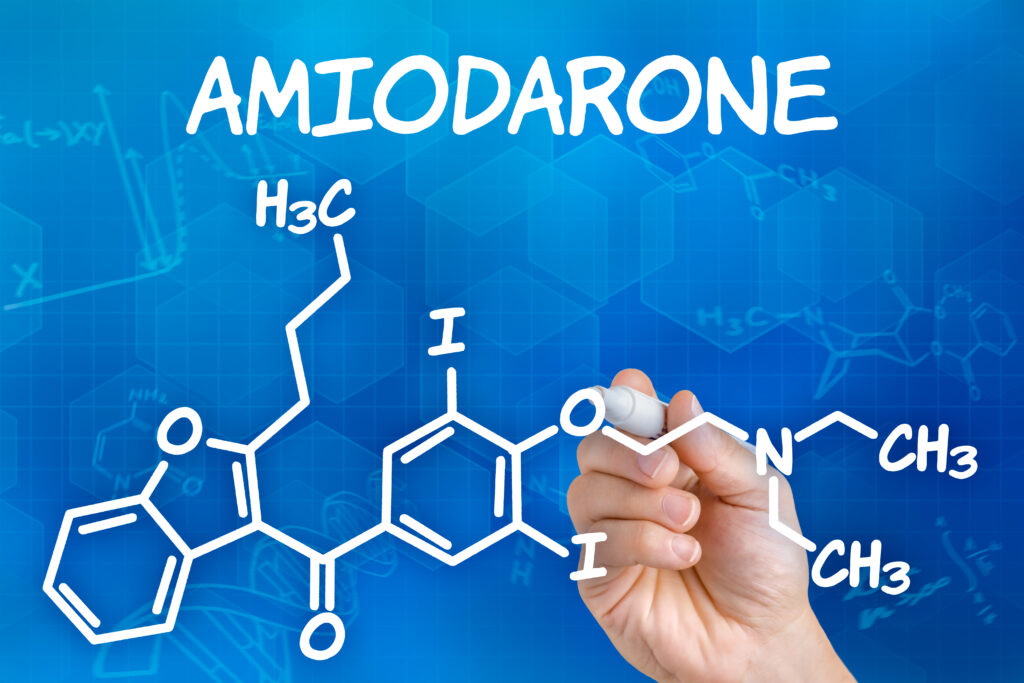
Several types of drugs and medications can have an impact on the thyroid and its function. Whether it’s due to the impairment of hormone production, the altering of thyroxine, or the malabsorption of thyroid hormones, certain medications can have dramatic effects on thyroid hormones in individuals.
Depending on the individual, certain drugs may or may not negatively interact with the thyroid. Several factors play a role in the way in which drugs affect or don’t affect the thyroid.
In what follows, we’ll be discussing some common drugs known to affect the thyroid and its function. More specifically, we’ll discuss antithyroid drugs, lithium, and amiodarone and describe their immediate and long-term effects.
Antithyroid Drugs and the Effects on the Thyroid
Antithyroid medications are used to treat hyperthyroidism, a condition in which the thyroid gland produces too much thyroid hormone. These drugs work by inhibiting the production of thyroid hormones in the thyroid gland, effectively treating the condition.
When antithyroid medications are first taken, they reduce the production of thyroid hormones by blocking the activity of thyroid peroxidase, an enzyme involved in the synthesis of thyroid hormones.
This reduction in the production of thyroid hormones leads to a decrease in the levels of free thyroid hormones in the bloodstream. Antithyroid medications also inhibit the uptake of iodine by the thyroid gland, further reducing the production of thyroid hormones. These immediate effects help control the symptoms of hyperthyroidism. However, these medications need to be monitored closely to prevent complications.
Over time, the use of antithyroid medications may lead to hypothyroidism as a result of lowering thyroid levels too much. This occurs because the drugs prevent the thyroid gland from producing the hormones needed to maintain normal thyroid function.
Long-term use of antithyroid medications may also cause damage to the thyroid gland, leading to the development of permanent hypothyroidism.
While it appears to be generally safe and efficacious, it’s important to consider both the immediate and long-term effects of antithyroid medications when deciding on a treatment plan for individuals.
Regular monitoring of thyroid hormone levels and close communication with your healthcare provider can help ensure that the medications have the desired effect and that the thyroid gland remains healthy over time.
Lithium and its Effects on the Thyroid
Lithium is a commonly used medication for the treatment of bipolar disorder. However, it can have significant effects on thyroid function, which can impact overall health and well-being.

First, lithium has been shown to disrupt the synthesis of thyroid hormones by blocking the activity of enzymes involved in this process. This disruption can lead to a decrease in the levels of thyroid hormones in the bloodstream and an increase in the levels of thyroid-stimulating hormone (TSH).
Second, lithium has also been shown to reduce the levels of TSH, which is a hormone produced by the pituitary gland that stimulates the thyroid gland to produce thyroid hormones. This reduction in TSH levels can further decrease the production of thyroid hormones, leading to hypothyroidism.
Finally, lithium has also been associated with the development of painless thyroiditis, a condition in which the thyroid gland becomes inflamed and releases large amounts of thyroid hormones into the bloodstream. This release of thyroid hormones can cause symptoms of hyperthyroidism, including rapid heart rate, weight loss, and increased sweating. Painless thyroiditis is typically a temporary condition, but it can have long-term effects on thyroid function if not properly managed.
Lithium can have significant effects on thyroid function. It’s important to monitor thyroid function while taking lithium and to discuss any concerns with your healthcare provider. Regular blood tests can help ensure that thyroid hormone levels remain within a healthy range and that any changes are promptly addressed.
Amiodarone and its Effects on the Thyroid
Amiodarone is a medication used to treat heart rhythm disorders. However, it can have significant effects on thyroid function, particularly due to its high content of iodine.
Amiodarone causes an increase in the amount of iodine in the blood, which can affect the levels of thyroid hormones in several ways. The increased iodine can lead to an increased production of thyroid hormones, which can cause hyperthyroidism.

In some cases, the increased iodine can also lead to the development of thyroid nodules, which are lumps or growths in the thyroid gland.
In addition to its effects on thyroid hormone levels, amiodarone can also cause changes in the structure of the thyroid gland. The drug can accumulate in the thyroid gland, causing it to become enlarged and fibrous.
This accumulation of amiodarone in the thyroid gland can lead to a condition called amiodarone-induced thyrotoxicosis, which is a type of hyperthyroidism.
The effects of amiodarone on thyroid function can be significant and long-lasting. It’s important to monitor thyroid function while taking amiodarone and to discuss any concerns with your healthcare provider.
Regular blood tests can help ensure that thyroid hormone levels remain within a healthy range and that any changes are promptly addressed. If necessary, treatment for hyperthyroidism, such as antithyroid medications or radioactive iodine therapy, can be considered.
Final Thoughts
Various medications can have significant effects on thyroid function depending on your current thyroid status and medical circumstances.
Antithyroid medications, such as propylthiouracil and methimazole, work by reducing the production of thyroid hormones, which can lead to hypothyroidism in the long term. Lithium can disrupt the synthesis of thyroid hormones and lead to hypothyroidism. Finally, amiodarone can increase the amount of iodine in the blood and affect the levels of thyroid hormones.
Regular close monitoring of thyroid function is important while taking any of these medications, as early detection and treatment of any changes in thyroid hormone levels can help prevent long-term health consequences.
